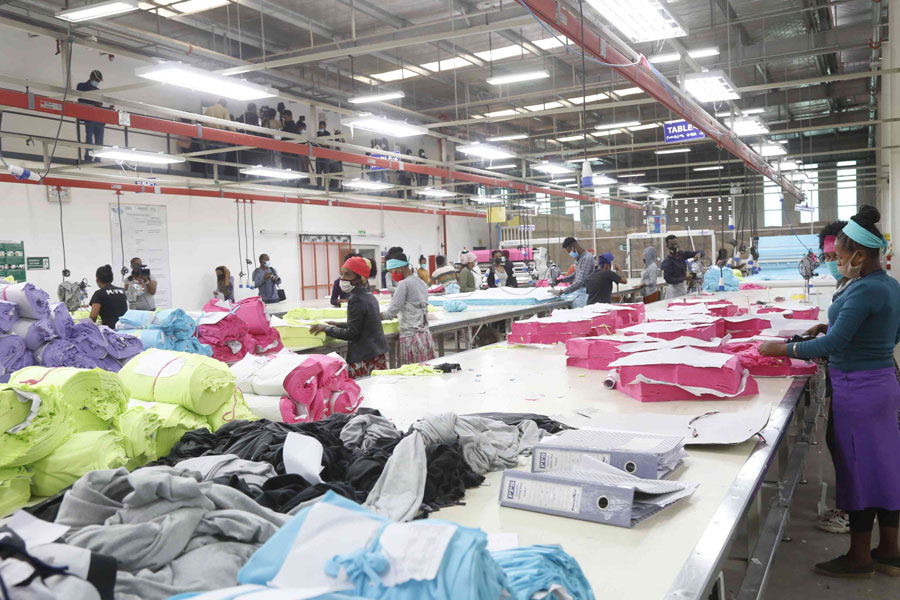
Fortune News | Apr 22,2022
Officials of the Ministry of Urban Development & Infrastructure have proposed a bill to out source the responsibility of property valuations from federal institutions to private property valuators.
The move comes at a time when federal authorities are determined to pass a law on property tax and hope to alleviate the burden on federal agencies struggling to decide on property values. Public discourse on the bill has been going on over the past two weeks. Private valuators, specialising in industrial, residential, or commercial properties, would ease the federal institutions' workload, according to Adane Egzie, head of the real property, market and valuation permit team at the Ministry.
"This is an initiative designed to improve the quality and protect the interests of property owners and financial institutions," Adane said.
The bill, under review at the Ministry of Justice, prescribes that city administrations and regional states would issue permits to the valuator after training and tests. It aspires to create a system where private valuation experts are not only trained but also held to a high standard, with their licenses up for review every three years. The existing setup has companies labelled as property valuators renewing their licenses as construction consultants, creating gaps between market prices and official valuations.
The prevailing system, plagued by insufficient qualified valuators, often results in misleading property valuations, causing conflicts between property owners, lenders, and state institutions. Although 250 consulting companies operate nationwide, none are designated explicitly as property valuators. Instead, companies labelled as property valuators renew their licenses as construction consultants, according to Abebe Banjaw, director of building regulation at the Ethiopian Construction Authority (ECA).
The Addis Abeba Construction Regulatory Authority recently amended building valuation rates to reconcile these disparities before transferring title deeds.
Nebiyu Wolde, leader of the Lideta District's resettlement project, expressed hope that outsourcing valuation processes to field experts would speed up compensation appraisals for residents displaced by development projects.
Industry insiders have praised the bill as a positive step towards enhancing the property valuation market, benefiting owners and lenders through reliable assessments. Banks have departments with engineers doing property rate valuations before loan approvals or foreclosure upon defaults. Their executives have welcomed the bill.
Worku Lema, vice president of Oromia International Bank (OIB), with a 31.2 billion Br loan portfolio last year, acknowledged that expertise in the field has been limited, often causing conflicts with property owners. He believes the bill will bring peace of mind with valid valuations.
"Disagreements prevail particularly during the foreclosure process," he said.
Companies seeking asset valuations for tax purposes and property owners requiring valuations also seek expertise.
Misganaw Abateneh, the founding shareholder of Trust Property Valuation & Management Plc, incorporated in 2018 with two million Br capital, expressed his excitement about the separate licensing plan. He had witnessed experts with unrelated fields of study dominate the market, often resulting in controversies.
"It would be a tool to challenge the unprofessional in the market," Misganaw told Fortune.
For Moges Wubet, a lecturer of urban land and property valuation at Debre Markos University, the importance of experts determining valid property values should be recognised, as the market lacks enrollment and mandate. His University graduated the first batch of 30 students this year; 52 more have been enrolled. He believes valuations based on experience and lack of methodological background often overlook crucial variables requiring expertise.
"It has to be conceptualised," said Moges.
While many see the bill as a positive development for Ethiopia's property valuation industry, experts like Tadesse Lencho, a tax policy expert and managing partner at Tbest Law Firm, warn that unscrupulous taxes and lenders may exploit inaccurate valuations, causing more harm than good.
"The subjective valuation system is the problem," Tadesse told Fortune.
PUBLISHED ON
[ VOL
, NO
]

Fortune News | Apr 22,2022

Radar | Jun 25,2022

Fortune News | Apr 09,2022

Verbatim | Jan 19,2024

Radar | Sep 14,2024

Radar | Jun 04,2022

Radar | May 21,2022

Fortune News | May 31,2025

Radar | Jan 04,2020

Fortune News | Jan 13,2024

Dec 22 , 2024 . By TIZITA SHEWAFERAW
Charged with transforming colossal state-owned enterprises into modern and competitiv...

Aug 18 , 2024 . By AKSAH ITALO
Although predictable Yonas Zerihun's job in the ride-hailing service is not immune to...

Jul 28 , 2024 . By TIZITA SHEWAFERAW
Unhabitual, perhaps too many, Samuel Gebreyohannes, 38, used to occasionally enjoy a couple of beers at breakfast. However, he recently swit...

Jul 13 , 2024 . By AKSAH ITALO
Investors who rely on tractors, trucks, and field vehicles for commuting, transporting commodities, and f...

Jul 5 , 2025
Six years ago, Ethiopia was the darling of international liberal commentators. A year...

Jun 28 , 2025
Meseret Damtie, the assertive auditor general, has never been shy about naming names...

Jun 21 , 2025
A well-worn adage says, “Budget is not destiny, but it is direction.” Examining t...

Jun 14 , 2025
Yet again, the Horn of Africa is bracing for trouble. A region already frayed by wars...